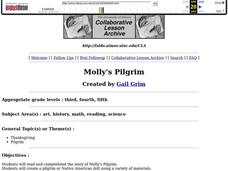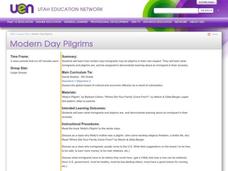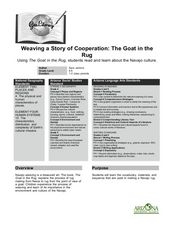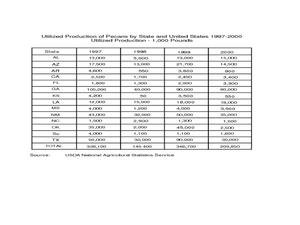Curated OER
Lives of Native Americans and Settlers
Students assess the effect of contact between the Native Americans and Europeans after 1492. They explore the lives of the early European colonists and the Native Americans living along the East Coast of North America. Lesson contains...
Curated OER
A River, Dead or Alive: Native Americans and European Colonists' Treatment of a River
Learners write an expository paragraph about the uses of the Nashua River for the Native Americans and the European Colonists. In this river uses lesson plan, students determine the causes and effects of both parties using the river.
Curated OER
The Affects of Environment on Native American Culture
Students research the culture of the Native Americans. In this U.S. History lesson, students are given the major geological areas where the Indians lived prior to the arrival of the Europeans, then they create a notebook that compares...
Curated OER
Molly's Pilgrim
Students read the story of Molly's Pilgrim, create a Native American doll, and explore the meaning of the word pilgrim.
Curated OER
Celebrate Colonial Maryland
Students research colonial Maryland. In this colonial Maryland lesson, students participate in a WebQuest to investigate how families led their lives long ago. Students compare family and city life from long ago and today. Students...
Curated OER
Happy Thankgiving: Traditions in Culture
Young scholars relate their own Thanksgiving experiences to those of the past through colonial games, Thanksgiving story books, and personal interviews. They develop a concept of how to celebrate Thanksgiving and plan a class time...
Curated OER
How - To - Posters
Students investigate the skills needed to survive for the early colonial settlers and Native Americans. They conduct research, develop a list of skills, and create a how-to poster demonstrating a survival skill.
Curated OER
Comparison of American Colonies
Students explore the lifestyles of the American colonies. They conduct various activities according to their grade level including jigsaw research and creating a poster. Lesson includes primary source readings related to the topic.
Curated OER
The Telling: A Thanksgiving Story
students use literature to compare and contrast different points of view on the first Thanksgiving.
Curated OER
Fur Trading
Students take on a role such as a farming community, hunting community or a trading post. They decide which products they focus on and then trade with the other groups.
Curated OER
Volunteering Requires Freedom of Choice
Students explore ways to volunteer. In this volunteerism and philanthropy lesson, students brainstorm how the early Americans benefited from philanthropy, then discuss how others benefit from our philanthropy and how we choose ways to...
Curated OER
The Cherokee: Trail Where They Cried
Students read the Trail of Tears about the Cherokee Nation removal and write a letter pretending they are the grandparent of a Cherokee child. In this Trail of Tears lesson plan, students understand the changing of boundaries.
Curated OER
Modern Day Pilgrims
Students examine the similarities and differences between modern day immigrants and pilgrims. They listen to stories, discuss their ancestors' origins, and create a native costume for a paper doll for where their ancestor is from.
Curated OER
Rules, Rules, Rules
Fourth graders create their classroom rules. In this Mayflower Compact lesson plan, 4th graders listen to the Plymouth story and learn about the Mayflower Compact. Students analyze the Mayflower Compact and create a class compact of...
Curated OER
Molly's Pilgrim
Young scholars read Molly's Pilgrim and discuss what the word pilgrim means and what they think they look like. In this pilgrim lesson, students design a clothespin doll to represent a pilgrim.
Curated OER
Weaving a Story of Cooperation: The Goat in the Rug
Weaving is an important part of Navajo culture. Read The Goat in the Rug to your fourth and fifth graders, and give them a glimpse into the process of rug making from the point of view of a goat! They will learn new vocabulary words and...
Curated OER
Love A Lobster
Learners discuss the appearance of a lobster. Using pre-cut parts, they create their own lobster and name each part of its anatomy. As a class, they listen and participate in exploring background information on the lobster and its...
Curated OER
Ancient Gold Working
Learners create a sculpture inspired by the masks, pendants, or human and animal forms found in ancient Indian art of the Americas. They focus on the techniques of metalworking, especially repousse.
Curated OER
Pecan Power
Students study the origins of pecans and complete a bar graph from the data they have discovered. In this pecan lesson plan, students draw pecans, discuss a pecan time line, and draw a bar graph comparing Arizona pecans to other states.
Curated OER
Immigration in the United States
Students examine the theory of immigration and how their ancestors became part of this Nation. They determine how immigration affected the United States through research and language activities. They construct a timeline of a time in...
Curated OER
Developing Flags
Students examine why having a symbol such as a flag is important for countries. In this flag lesson, students break into groups and create their own flag to represent their group dynamic.






















